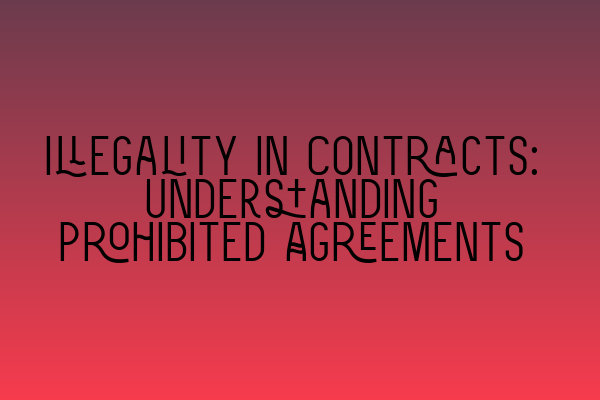Illegality in Contracts: Understanding Prohibited Agreements
Contracts are the bedrock of commercial dealings, providing a framework of legal obligations and rights for parties involved. However, there are instances where contracts can be rendered illegal and unenforceable due to the presence of prohibited agreements. It is essential for legal professionals and individuals alike to understand the concept of illegality in contracts to protect themselves from legal repercussions and ensure fair and ethical business practices.
In this blog post, we will delve into the intricacies of prohibited agreements, their implications, and how they can affect the validity of contracts. We will explore various examples of illegality in contracts, highlighting the importance of thorough due diligence and legal advice in avoiding such pitfalls.
Understanding Prohibited Agreements
A prohibited agreement is an agreement that goes against the law or public policy. Such agreements are considered void and unenforceable by the courts. The law aims to discourage and prevent parties from entering into agreements that are morally or legally wrong, ensuring justice and fairness in contractual relationships.
Examples of Prohibited Agreements
1. Agreements Contrary to Public Policy: An agreement that goes against public policy, such as those promoting illegal activities or infringing on public health and safety, will be deemed void. For instance, a contract to provide illegal drugs or to engage in fraudulent activities would be considered void.
2. Agreements in Restraint of Trade: Contracts or clauses that unreasonably restrict individuals’ freedom to engage in trade or business activities are generally unenforceable. Non-compete agreements that go beyond what is necessary to protect legitimate business interests, for example, may be considered contrary to public policy and void.
3. Agreements Tending to Defeat the Provisions of Law: Contracts with the intent to evade the law or defeat the purpose of legislation are generally unenforceable. For instance, an agreement to pay an individual “under the table” to avoid tax obligations would be considered illegal.
4. Agreements That Violate Statutory Requirements: Certain agreements must comply with specific legal requirements to be valid. For example, contracts relating to the sale of land often require written documentation to be enforceable. Failure to meet these statutory requirements renders the agreement void.
Implications of Illegality in Contracts
When a contract is deemed illegal or unenforceable due to the presence of prohibited agreements, significant implications arise for the parties involved. These implications may include:
1. Contractual Obligations: Parties cannot rely on an illegal contract to enforce their rights or seek remedies for breach of contract. The court will refuse to enforce illegal agreements, leaving the parties without legal recourse.
2. Criminal Liability: Engaging in illegal activities through contracts may subject parties to criminal liability. For example, participating in a contract to carry out fraudulent activities could result in criminal charges.
3. Forfeiture of Consideration: If a contract is found to be illegal, any consideration provided under the contract, such as money or goods, may be forfeited. Parties cannot recover their investments or seek compensation for losses resulting from illegal agreements.
Avoiding Illegality in Contracts
To avoid illegality in contracts, it is crucial to conduct thorough due diligence and seek legal advice when entering into agreements. By ensuring compliance with relevant laws and public policy, parties can protect themselves from the consequences of illegality. Additionally, regular updates on legal developments and staying informed about changes in legislation are essential to maintaining ethical and legal business practices.
In conclusion, understanding the concept of illegality in contracts is vital for all parties involved. Prohibited agreements can have severe consequences, rendering contracts unenforceable and exposing parties to legal liabilities. By recognizing and avoiding potential prohibited agreements, individuals and businesses can ensure they operate within the bounds of the law and maintain fair and ethical contractual relationships.
For more information on preparing for the SQE 1 exam and practice resources, check out our related articles:
– SQE 1 Practice Exam Questions
– SQE 1 Practice Mocks FLK1 FLK2
If you are planning to take the SQE 2 exam, we also offer comprehensive preparation courses to help you succeed:
To start your journey towards becoming a qualified solicitor, explore our SQE 1 preparation courses:
Stay updated on important dates and examination information:
Remember, knowledge and compliance with the law are the foundations of a successful legal career.
